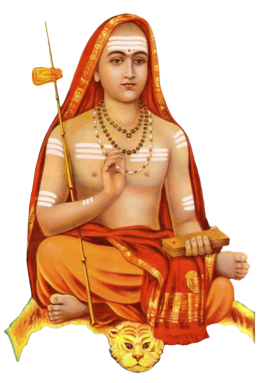कोशो ममाहमिति वस्तुविकल्पहेतुः ।
संज्ञादिभेदकलनाकलितो बलीयांस्
तत्पूर्वकोशमभिपूर्य विजृम्भते यः ॥ १६७ ॥
kośo mamāhamiti vastuvikalpahetuḥ |
saṃjñādibhedakalanākalito balīyāṃs
tatpūrvakośamabhipūrya vijṛmbhate yaḥ || 167 ||
प्रचीयमानो विषयाज्यधारया ।
जाज्वल्यमानो बहुवासनेन्धनैः
मनोमयाग्निर्दहति प्रपञ्चम् ॥ १६८ ॥
pracīyamāno viṣayājyadhārayā |
jājvalyamāno bahuvāsanendhanaiḥ
manomayāgnirdahati prapañcam || 168 ||
It is the mind that projects the objective universe—this is the plain meaning. See Sloka 170, below.
मनो ह्यविद्या भवबन्धहेतुः ।
तस्मिन्विनष्टे सकलं विनष्टं
विजृम्भितेऽस्मिन्सकलं विजृम्भते ॥ १६९ ॥
mano hyavidyā bhavabandhahetuḥ |
tasminvinaṣṭe sakalaṃ vinaṣṭaṃ
vijṛmbhite’sminsakalaṃ vijṛmbhate || 169 ||
ded in the mind. When the mind is thoroughly purified through Sadhana or discipline, the glory of the Atman manifests itself. This is said to be
liberation.
Destroyed—in the highest or Nirvikalpa Samadhi.
भोक्त्रादिविश्वं मन एव सर्वम् ।
तथैव जाग्रत्यपि नो विशेषः
तत्सर्वमेतन्मनसो विजृम्भणम् ॥ १७0 ॥
bhoktrādiviśvaṃ mana eva sarvam |
tathaiva jāgratyapi no viśeṣaḥ
tatsarvametanmanaso vijṛmbhaṇam || 170 ||
नैवास्ति किंचित्सकलप्रसिद्धेः ।
अतो मनःकल्पितेव पुंसः
संसार एतस्य न वस्तुतोऽस्ति ॥ १७१ ॥
naivāsti kiṃcitsakalaprasiddheḥ |
ato manaḥkalpiteva puṃsaḥ
saṃsāra etasya na vastuto’sti || 171 ||
मनसा कल्प्यते बन्धो मोक्षस्तेनैव कल्प्यते ॥ १७२ ॥
manasā kalpyate bandho mokṣastenaiva kalpyate || 172 ||
बध्नाति तेन पुरुषं पशुवद्गुणेन ।
वैरस्यमत्र विषवत्सुवुधाय पश्चाद्
एनं विमोचयति तन्मन एव बन्धात् ॥ १७३ ॥
badhnāti tena puruṣaṃ paśuvadguṇena |
vairasyamatra viṣavatsuvudhāya paścād
enaṃ vimocayati tanmana eva bandhāt || 173 ||
बन्धस्य मोक्षस्य च वा विधाने ।
बन्धस्य हेतुर्मलिनं रजोगुणैः
मोक्षस्य शुद्धं विरजस्तमस्कम् ॥ १७४ ॥
bandhasya mokṣasya ca vā vidhāne |
bandhasya heturmalinaṃ rajoguṇaiḥ
mokṣasya śuddhaṃ virajastamaskam || 174 ||
छुद्धत्वमासाद्य मनो विमुक्त्यै ।
भवत्यतो बुद्धिमतो मुमुक्षोस्
ताभ्यां दृढाभ्यां भवितव्यमग्रे ॥ १७५ ॥
chuddhatvamāsādya mano vimuktyai |
bhavatyato buddhimato mumukṣos
tābhyāṃ dṛḍhābhyāṃ bhavitavyamagre || 175 ||
Renunciation—of the Non-self.
चरत्यत्र न गच्छन्तु साधवो ये मुमुक्षवः ॥ १७६ ॥
caratyatra na gacchantu sādhavo ye mumukṣavaḥ || 176 ||
स्थूलात्मना सूक्ष्मतया च भोक्तुः ।
शरीरवर्णाश्रमजातिभेदान्
गुणक्रियाहेतुफलानि नित्यम् ॥ १७७ ॥
sthūlātmanā sūkṣmatayā ca bhoktuḥ |
śarīravarṇāśramajātibhedān
guṇakriyāhetuphalāni nityam || 177 ||
Action—to obtain desired results.
Means—for these actions.
Results—such as enjoyment or liberation.
देहेन्द्रियप्राणगुणैर्निबद्ध्य ।
अहंममेति भ्रमायात्यजस्रं
मनः स्वकृत्येषु फलोपभुक्तिषु ॥ १७८ ॥
dehendriyaprāṇaguṇairnibaddhya |
ahaṃmameti bhraMāyātyajasraṃ
manaḥ svakṛtyeṣu phalopabhuktiṣu || 178 ||
अध्यासबन्धस्त्वमुनैव कल्पितः ।
रजस्तमोदोषवतोऽविवेकिनो
जन्मादिदुःखस्य निदानमेतत् ॥ १७९ ॥
adhyāsabandhastvamunaiva kalpitaḥ |
rajastamodoṣavato’vivekino
janmādiduḥkhasya nidānametat || 179 ||
येनैव भ्राम्यते विश्वं वायुनेवाभ्रमण्डलम् ॥ १८0 ॥
yenaiva bhrāmyate viśvaṃ vāyunevābhramaṇḍalam || 180 ||
विशुद्धे सति चैतस्मिन्मुक्तिः करफलायते ॥ १८१ ॥
viśuddhe sati caitasminmuktiḥ karaphalāyate || 181 ||
निर्मूल्य संन्यस्य च सर्वकर्म ।
सच्छ्रद्धया यः श्रवणादिनिष्ठो
रजःस्वभावं स धुनोति बुद्धेः ॥ १८२ ॥
nirmūlya saṃnyasya ca sarvakarma |
sacchraddhayā yaḥ śravaṇādiniṣṭho
rajaḥsvabhāvaṃ sa dhunoti buddheḥ || 182 ||
Hear big etc.—i. e. hearing (from the lips of the Guru), reflection and meditation, of the highest Vedantic truth—the identity of the Jiva and Brahman.
ह्याद्यन्तवत्त्वात्परिणामिभावात् ।
दुःखात्मकत्वाद्विषयत्वहेतोः
द्रष्टा हि दृश्यात्मतया न दृष्टः ॥ १८३ ॥
hyādyantavattvātpariṇāmibhāvāt |
duḥkhātmakatvādviṣayatvahetoḥ
draṣṭā hi dṛśyātmatayā na dṛṣṭaḥ || 183 ||
Vivekachudamani – Introduction
1: Devoted Dedication
2: Glory of Spiritual Life
3: Unique Graces in Life
4-7: Miseries of The Unspiritual Man
8-13: Means of Wisdom
14-17: The Fit Student
18-30: The Four Qualifications
31: Bhakti – Firm and Deep
32-40: Courtesy of Approach and Questioning
41-47: Loving Advice of the Guru
48-49: Questions of the Disciple
50: Intelligent Disciple – Appreciated
51-55: Glory of Self-Effort
56-61: Knowledge of the Self-Its Beauty
62-66: Direct Experience – Liberation
67-71: Discussion on Questions Raised
72-75: Gross Body
76-82: Sense Objects a Trap – Man Bound
83-86: Fascination for Body Criticised
87-91: Gross Body Condemned
92: Organs of Perception and Action
93-94: Inner Instruments
95: The Five Pranas
96-101: Subtle Body – Effects
102: Functions of Prāna
103-105: Ego Discussed
106-107: Infinite Love – the Self
108-110: Māyā – Pointed Out
111-112: Rajoguņa – Nature and Effects
113-116: Tamoguņa – Nature and Effects
117-119: Sattvaguņa – Nature and Effects
120-121: The Causal Body – Its Nature
122-123: Not-Self – Description
124-135: The Self – Its Nature
136: Advice for Self-control
137-142: What is Bondage – The Reply
143-144: The Powers – Agitation and Veiling
145-146: Bondage in Action
147-153: Ātman and Anātman – Discrimination
Negation of the Kośas
154-164: – Annamaya kośa (Food sheath)
165-166: – Prņamaya kośa (Vital air sheath)
167-183: – Manomaya kosa (Mental sheath)
184-188: – Vijnanamaya kośa (Intellectual sheath)
189-191: Ātman – Unattached
192-193: What is Liberation? – Disciple
194-206: Self-Knowledge gives Liberation
207-210: Anandamaya kośa (Bliss sheath)
211: Ātman – Other than the Five Kośas
212: What is Ātman? – Disciple
213-225: Nature of the Self – Discussion
226-236: All Manifestation Absolute
237-240: Brahman – Its Nature
241-249: That Thou Art – Explanation
250-253: Attitude in Meditation
254-266: Aids to Meditation
267-276: Give up Vāsanās – the Method
277-292: End Superimposition – The Means
293-297: The Perceived I’ Factor – False
298-309: Condemnation of the Ego
310-319: Actions, Thoughts and Vāsanās – Renounce
320-329: Total Vigilance – Its Price
330-338: In the One, No Plurality
339-348: Spiritual Growth – the Secret
349-353: Cause-Effect – False
354-372: Samadhi – Its Nature
373-378: Fully Detached – Samadhi Easy
379-383: Meditation – the Technique
384-397: Continuous Attention to Self
398-406: No Diversity in Reality
407-413: Ātma-vicāra – Contemplation
414-418: Give up Perceptions
419-425: The Science of Reality – Its Benefits
426-445: Signs of a Realised Seer
446-464: Prārabdha for a Saint
465-471: There is No Plurality
472-479: Experience of Selfhood
480-520: Practice of Knowledge – Disciple
521-575: Final Words of Advice
576-578: Blessed Disciple Liberated
579-581: The Glory of the Textbook

Vivekachudamani – Verses 167-183 – Vivekachudamani Verses 167-183 – By Adi Sankaracharya – In Sanskrit with English Meaning, Transliteration, Translation, Commenary, Lyrics, Audio – Vivekachudamani-167-183
